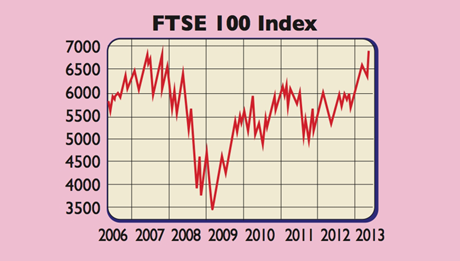
Equity investors are partying like it’s 1999, said City AM. Britain’s FTSE 100 eclipsed 6,800 early this week. That’s not far from its all-time closing high of 6,930, reached on 30 December, 1999.
The blue-chip index has gained 15% since the beginning of the year, and 30% since last summer. The mid-cap FTSE 250 index has already reached a new record, as have America’s main stock benchmarks, the Dow Jones and the S&P 500. European and Japanese indices are at new post-crisis highs.
What the commentators said
“Normally,” said Jeremy Warner in The Daily Telegraph, the return of animal spirits would presage “better times ahead”, but this time there’s “a more ominous explanation: central bank money printing”, or quantitative easing (QE). The flood of artificially created liquidity is lifting all asset prices, which seem “ever more divorced from economic reality”.
The fundamentals certainly don’t justify this rapid rally. The prospect of a total meltdown in Europe has receded, but five years on from the crisis, the global economy has still not managed a self-sustaining recovery. As John Authers noted in the FT, since September 2011, global earnings per share have been flat, yet share prices have gained 30%. The latest earnings season has revealed little growth in corporate profits, and “no growth at all in top-line sales”. Margins are already high. All in all, then, the earnings picture is hardly inspiring.
But while rallies based on cheap or free money, rather than a solid economic outlook, are always vulnerable to nasty setbacks, there could still be quite a way to go. For one thing, the Goldilocks backdrop – an economy hot enough to grow slowly, yet still cool enough to need central bank help – is unlikely to change any time soon.
And more and more investors seem to be turning to equities as yields elsewhere slide. “The mood is increasingly turning towards fear of [missing] a ‘melt-up’,” reckoned Société Générale’s Andrew Lapthorne, “rather than a collapse back down towards disappointing fundamentals”.
Nor are stocks expensive yet. So selling in May could be a mistake this year. But what will happen when the “QE-helium tap” is permanently shut off? asked Philip Aldrick on Telegraph.co.uk. Liquidity-obsessed markets have become “completely detached from economic reality… it’s going to be ugly”.